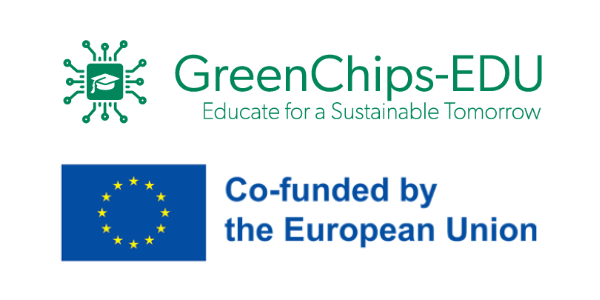The EU-funded research project GreenChips-EDU allows participants to complete a full Executive MBA Programme at a reduced price. This university certificate programme combines academic excellence with practical leadership skills in the context of digital transformation.
Learn about groundbreaking technologies and materials, expand your skills in life cycle assessment and circular economy in the field of microelectronics, and gain an overview of the macroeconomic and legal context in which electronics companies operate.


Cooperation
In 2026, this university certificate programme is offered in cooperation with the EU co-funded research project GreenChips-EDU.
Next programme start: 02 March 2026
Application deadline: 30 January 2026
Information events (online via Webex):
- 12 November 2025, 4:00–5:00 p.m., registration
- 17 December 2025, 4:00–5:00 p.m., registration
- 14 January 2026, 4:00–5:00 p.m., registration
- Academic degree: Executive Master of Business Administration (EMBA)
- Duration: 18 months (3 semesters), of which 31 days are in-person classes (1st semester: 15 days of attendance, 2nd semester: 10 days of attendance, and 3rd semester: 6 days of attendance)
- ECTS credit points: 75
- Language of instruction: English and German
- Standard course fee: EUR 24,900 (VAT-free)
- Subsidized participation fees within the co-financed EU research project GreenChips-EDU starting in March 2026:
See info box - Minimum number of participants: 10, max. 25
- Location: Graz University of Technology and online
Curriculum (only available in German)
The university program with the specialization "Green Microelectronics" is supported as part of the co-financed research project GreenChips-EDU (only for the start date in March 2026!).
Example: With a total of 10 participants, the subsidized participation fee is €6,500 (VAT-exempt). This fee does not include travel, accommodation, or meal expenses.
The participation fee increases if there are fewer than 10 participants and decreases if there are more than 10 participants.
This funding is only available to EU citizens and individuals whose primary residence is in the EU.
No separate application is required.
Content and emphasis
Participants will receive a scientifically sound yet action-oriented training at both the operational and the strategic level, with particular emphasis on the production of recyclable and energy-efficient semiconductors made from environmentally friendly materials.
The EMBA programme consists of the following modules (these can also be booked individually as university courses):
- Core Modules in Digital Transformation:
- Modules in Executive Leadership Development
- Modules in Green Microelectronics (Specialisation):
In addition, participants are expected to write a master’s thesis.
The part-time EMBA programme has a modular structure, and teaching takes place in the form of blended learning (a combination of distance learning and attendance units).
Each module consists of 3 phases:
- Online phase: In this phase, you will acquire fundamental knowledge about the subject in a self-directed manner by referring to basic literature and learning videos. Participants can access the TU Graz "TeachCenter" learning platform in order to ask questions and exchange information with lecturers and other course participants. Scope: 1.5 ECTS
- Attendance phase: In the attendance phase, you have an opportunity to discuss the acquired knowledge is discussed, reflect upon it, further deepen this knowledge, and to apply it to case study examples (an attendance block is held at TU Graz every two to three months, each time from Monday to Friday). Scope: 1.5 ECTS. Students who cannot be on site for professional reasons can participate in the lectures via the video conferencing system.
- Transfer phase: This phase is carried out individually at your own or a chosen company. In this phase, you have the opportunity to apply your acquired knowledge in the context of your company, fulfil a company task, or work to solve a company problem. Scope: 2 ECTS
Job prospects and career opportunities
You benefit from:
- A mixture of online and in-person teaching and learning (blended learning approach)
During the online stage of the programme, participants prepare each module independently in their own time. In the subsequent in-person stage, the knowledge gained is deepened, e.g., by working on practical case studies. - Transfer project
Participants have the opportunity to work on a business task or issue that is relevant to them and to apply the knowledge they have gained. - Customisation or tailoring of further training
Students can choose a specialisation that suits their interests and needs. Along with the part-time transfer project, they thus acquire the specific know-how needed for their everyday work. In their master’s thesis, they can address current professional challenges and develop solutions. - State-of-the-art scientific know-how
Research results from Graz University of Technology and its cooperation partners form the basis of the programme. Participants will thus have the opportunity to benefit from state-of-the-art first-hand expertise. - Networking and learning in a peer group
In targeted networking and dialogue events where real-life application and current theory are combined (e.g., onboarding conference, midterm conference), participants will have the opportunity not only to engage in technical and interdisciplinary exchanges with other participants, but also with experts.
- Graduates will understand the strategic interplay of artificial intelligence, collaboration tools and agile organisations with an increased level of self-organisation and the resulting change in the role of management.
- They will be capable of successfully managing an entire company or individual divisions ‒ both strategically and operationally ‒ in the context of digital transformation and can approach their management tasks in a holistic, networked and methodically supported manner.
- They will have the skills to design digital strategies and business models and to strategically reflect on and assess the benefits, limitations and opportunities of using technological solutions with an understanding of how to initiate and lead change and innovation projects.
- As the programme also emphasises Executive Leadership Development, they will be able to apply what they have learnt to real-world business challenges and implement new managerial skills in practice.
- They will gain a deeper understanding of semiconductor materials, design processes, and the strategic implications of adopting groundbreaking technologies, including wide-bandgap materials.
- They will understand sustainability and circular economy in microelectronics, as well as assessment methods such as life cycle assessment and social life cycle assessment.
- They will gain comprehensive knowledge of the macroeconomic and legal contexts in which electronics companies operate.
Target groups
The EMBA Digital Leadership is intended for executive personnel in a range of different industries who have several years of experience in leadership and management and who want to take the next step in their career or further develop their skills for their current position with regard to the broad field of developing and implementing digital transformation strategies (including leadership skills) against the backdrop of digital transformation.
- Engineers and technicians who wish to learn about sustainable production processes, energy-efficient chips, and ways of reducing e-waste.
- Environmental and sustainability experts who are looking to reduce the ecological footprint of microelectronics and/or are interested in “Green IT”.
- Entrepreneurs and start-up founders who aim to develop new business models in green microelectronics.
- Policymakers & NGO staff who are looking to promote sustainable microelectronics initiatives at a policy level.
Application and admission
Required application documents:
- Completed and signed application form
- CV
- Proof of academic degrees already obtained
- Recommendation letters and certificates
- Letter of motivation
- Copy of passport or ID card
The documents can be submitted by e-mail to: helmut.aschbacher@tugraz.at
The requirements for admission to the university certificate programme must provide proof of the following qualifications:
- Graduation from a technical, scientific, economic or legal degree programme (min. 180 ECTS credit points) and
- at least 2 years of qualified professional experience and
- sufficient knowledge of English as the language of instruction
Lecturers and contact information

Contact
Helmut ASCHBACHER
Dr.
TU Graz Life Long Learning
Phone: +43 316 873 4943
helmut.aschbacher@tugraz.at
Institute for Corporate Management and Organization
Kopernikusgasse 24/IV
8010 Graz
www.ufo.tugraz.at
Stefan Vorbach
Univ.-Prof. DI Dr.techn.
Tel.: +43 316 873 7500
stefan.vorbach@tugraz.at

